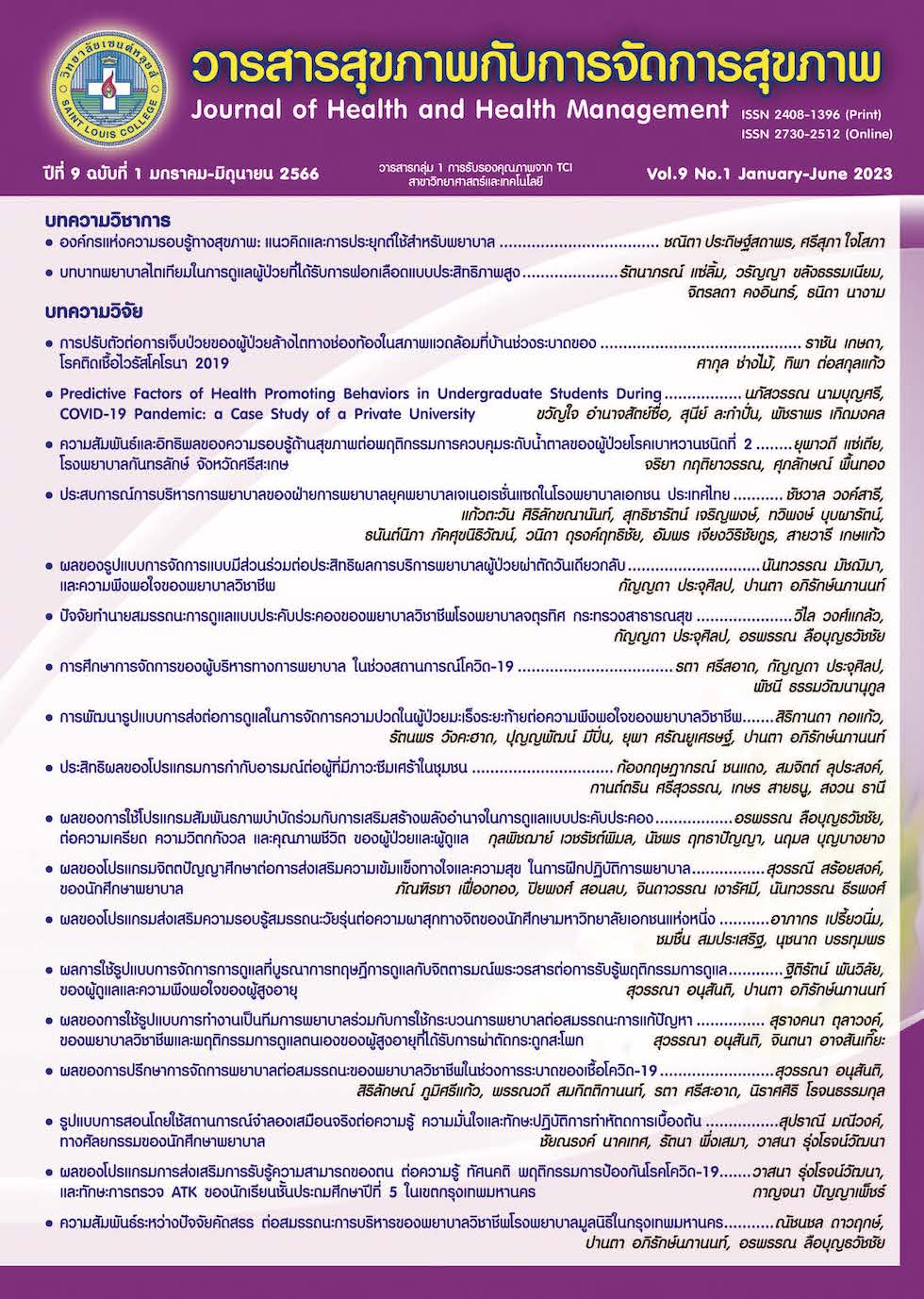The Development of Referral Continuing Care Model for Pain Management in Advance cancer Patient
Keywords:
The Referral Continuing Care Model, Advance Stage of Cancer Patient, Pain ManagementAbstract
The Quasi–Experimental Research aims to (1) to develop the referral continuing care model for pain management in advance stage of cancer patients(2) to compare pain management scores between experimental and control groups (2) to compare the satisfaction of the professional nurses toward the referral continuing care model for pain management between experimental and control groups. The samples were (1) professional nurses who involve in the referral continuing care model for pain management and (2) an advance stage of cancer patients at the End of Life stage with PPS level ≤ 50% who receiving treatment In Lopburi Cancer Hospital and plan discharge for continuing care at the community, 48 patients. There are 24 patients for experimental group. and 24 patients are control groups. The experimental instrument was used in this research project, developed by the researcher called the referral continuing care model for pain management in advance stage of cancer patients. And 2 instruments were used for collecting the data; the pain assessment scale and the tool for assessing satisfaction of 22 professional nurses toward the referral continuing care model, using non-parametric statistics of Mann-Whitney U-test. The results revealed that (1) The experimental group had mean scores of pain scores lower than those in the control group at the level of 95 percent confidence (p-value =<.05). (2) The experimental group, professional nurses had mean score of the satisfaction of the referral continuing care model higher than the control group level of at the level of 95 percent confidence (p-value <.05). Therefore, the referral continuing care model for pain management in advance stage of cancer patients in Lopburi Cancer Hospital can manage life threatening on suffering for pain than traditional referral care model for pain management.
References
ชยาวรักษ์ สัจจวาณิชย์, และ ศิวพล ศรีแก้ว. (2560). การพัฒนาแบบบันทึกการส่งต่อผู้ป่วยหลังได้รับยาระงับความรู้สึกในผู้ป่วยวิกฤตที่ใส่ท่อช่วยหายใจ. วารสารมหาวิทยาลัยนครพนม ฉบับการประชุม วิชาการครบรอบ 25 ปี, นครพนม: มหาวิทยาลัยนครพนม.
ชุติมา เทียนทอง, ศรีเวียง ไพโรจน์กุล, และปาริชาติ เพียสุพรรณ์. (2564). การกลับมารักษาซ้ำในโรงพยาบาลของผู้ป่วยที่ได้รับการดูแลแบบประคับประคอง ศูนย์การุณรักษ์โรงพยาบาลศรีนครินทร์. ศรีนครินทร์เวชสาร, 36(4), 469-473.
นิอร สิริมงคลเลิศกุล, ฐานุตร์ ถมังรักษ์สัตว์, พบสุข ตัณสุหัช, วิทยศักดิ์ รุจิวรกุล, ชมพูนุท สิงห์มณี, สายพิน กัญชาญพิเศษ, และจรวยพร ใจสิทธิ์. (2565). การพัฒนาระบบส่งต่อผู้ป่วยโรคหลอดเลือดสมองผ่านระบบมือถืออัจฉริยะ (Stroke Man). เวชสารแพทย์ทหารบก, 75(1), 39-49.
ภูษิต ประคองสาย. (2559). การสาธารณสุขไทย 2554-2558. กรุงเทพฯ: โรงพิมพ์องค์การสงเคราะห์ทหารผ่านศึก.
รัตนาภรณ์ รักชาติ, สุภาภรณ์ อุดมลักษณ์, กัญญา ศรีอรุณ, ปานจิตร์ วงศ์ใหญ่, และภัทรนัย ไชยพรม. (2565). การพัฒนารูปแบบการดูแลผู้ป่วยมะเร็งแบบประคับประคองและระยะท้ายโดยการมีส่วนร่วมของเครือข่ายชุมชนต้นแบบหมู่บ้านปลอดมะเร็ง จังหวัดลำปาง. วารสารการพยาบาลและสุขภาพ สสอท, 4(2), 1-19
ศรีเวียง ไพโรจน์กุล และปาริชาติ เพียสุพรรณ์. (2561). แนวทางการดำเนินงานศูนย์ดูแลประคับประคองในโรงพยาบาล Operational Guidelines for Hospital Palliative Care Program. ขอนแก่น: โรงพิมพ์คลังนานาวิทยา.
Hasson, F., Nicholson, E., Muldrew, D., Bamidele, O., Payne, S., & McIlfatrick, S. (2020). International palliative care research priorities: a systematic review. BMC palliative care, 19(1), 1-16.
World Health Organization. (2014).definition of palliative care. Retrieved from https://www.who.int/news-room/fact-sheets/detail/palliative-care
Hospice Eligibility. (2021). Hopice Eligibility. Retrieved from https://www.alivehospice.org/wp-content/uploads/2021/06/HospiceEligibility-2021.pdf
Downloads
Published
How to Cite
Issue
Section
License
Copyright (c) 2023 Journal of health and health management

This work is licensed under a Creative Commons Attribution-NonCommercial-NoDerivatives 4.0 International License.




